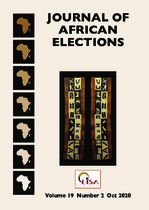| dc.contributor.author | Mujuzi, Jamil Ddamulira | |
| dc.date.accessioned | 2020-12-04T07:51:20Z | |
| dc.date.available | 2020-12-04T07:51:20Z | |
| dc.date.issued | 2020 | |
| dc.identifier.citation | Mujuzi, J.D. (2020) Prisoners' right to vote in Uganda: Comment on Kalali Steven v Attorney General and the Electoral Commission. Journal of African Elections, 19(2): 18-32. DOI: 10.20940/JAE/2020/v19i2a2 | en_US |
| dc.identifier.issn | 16094700 | |
| dc.identifier.uri | https://dx.doi.org/10.20940/JAE/2020/v19i2a2 | |
| dc.identifier.uri | https://www.eisa.org/pdf/JAE19.2Mujuzi.pdf | |
| dc.identifier.uri | http://hdl.handle.net/10566/5480 | |
| dc.description.abstract | Article 59 of the Constitution of Uganda (1995) provides for the right to
vote. Although the Constitution does not prohibit prisoners from voting, the
Uganda Electoral Commission has never made arrangements for prisoners
to vote. On 17 June 2020, in the case of Kalali Steven v Attorney General
and the Electoral Commission, the Ugandan High Court held that prisoners
and Ugandans in the diaspora have a right to vote and that the Electoral
Commission should put in place arrangements for them to vote. Uganda
will have elections in 2021. The purpose of this article is to suggest practical
ways in which the Electoral Commission can comply with the High Court
judgement. It is argued, inter alia, that there is no need for legislation to be
enacted or amended to give effect to the High Court judgment. | en_US |
| dc.language.iso | en | en_US |
| dc.publisher | EISA | en_US |
| dc.subject | Uganda | en_US |
| dc.subject | Correctional services | en_US |
| dc.subject | Elections | en_US |
| dc.subject | Prisoners | en_US |
| dc.subject | Electoral Commission | en_US |
| dc.subject | Prisoners' rights | en_US |
| dc.title | Prisoners' right to vote in Uganda: Comment on Kalali Steven v Attorney General and the Electoral Commission | en_US |
| dc.type | Article | en_US |

